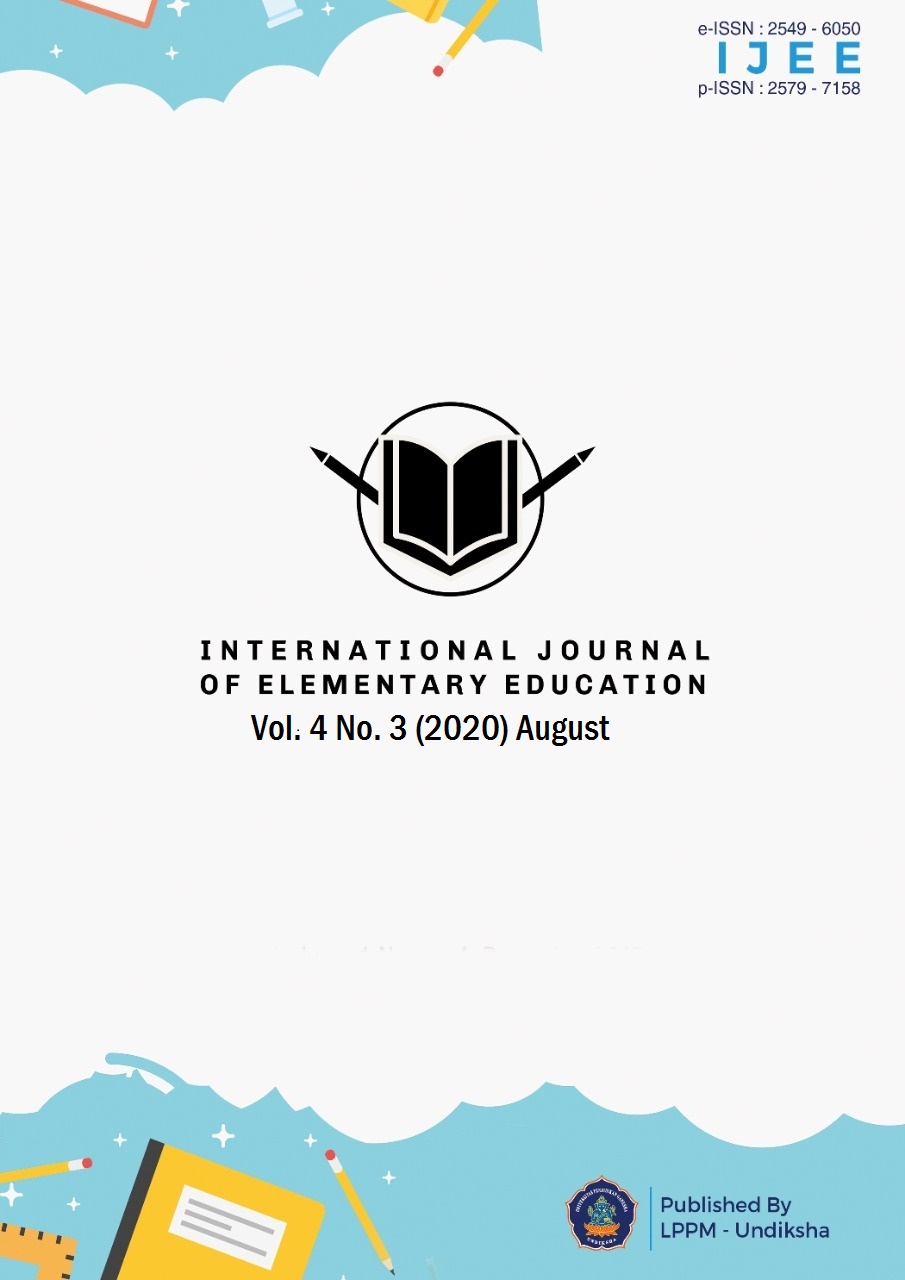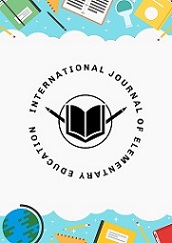Contribution of Naturalist Intelligence and Learning Participation toward Students’ Knowledge Competence in Science
DOI:
https://doi.org/10.23887/ijee.v4i3.26298Kata Kunci:
naturalist intelligence, learning participation, IPAAbstrak
Science competence of students continues to develop because it is influenced by factors of intelligence and participation. Lack of understanding of the importance of student participation in obtaining more optimal learning outcomes is no longer one of the priority factors, so students tend to feel lazy, and find it difficult to express opinions which cause the competence of science knowledge does not increase. This study aimed to analyze the significant effect of naturalist ability on the competence of science knowledge, the significant effect of learning participation on the competence of science knowledge, and the significant effect together of naturalist ability and learning participation on the competence of science knowledge of fourth grade students. This type of research is ex-post facto. The population in this study were all fourth-grade students, amounting to 490 students. The sample was determined by proportional random sampling technique and obtained a total sample of 214 people. Naturalist ability data collection and learning participation were obtained by distributing questionnaires and competence in science knowledge was obtained by recording documents. The data analysis technique used was multiple linear regression analysis. The results showed that there was a significant effect of naturalist ability on the competence of science knowledge with a contribution of 12.68%, there was a significant influence of learning participation on the competence of science knowledge with a contribution of 35.44%, and there was a significant influence on naturalist ability and learning participation. to the competence of science knowledge with a contribution of 48.12%. Based on the results of the study, it can be concluded that naturalist abilities and learning participation contribute to the competence of science knowledge of fourth grade elementary school students
Referensi
Agung, A. A. G. (2014). Buku Ajar Metodologi Pendidikan. Malang: Aditya Media Publishing.
Anna, C. (2016). Hubungan Kecerdasan Naturalis Dengan Sikap Peduli Lingkungan Siswa Kelas Iii Sd Se-Kecamatan Gondokusuman. Jurnal Pendidikan Guru Sekolah Dasar, 5(25), 411–425. http://journal.student.uny.ac.id/ojs/index.php/pgsd/article/view/4226
Arikunto, S. (2010). Prosedur Penelitian Suatu Pendekatan Praktik. Jakarta: PT. Rineka Cipta.
Arini, D. (2018). Hubungan Kecerdasan Logis Matematis dan Partisipasi Belajar dengan Nilai Hasil Belajar Siswa pada Mata Pelajaran IPA di SD IT Insantama. Jurnal Pendidikan, 1, 1. http://pkm.uika-bogor.ac.id/index.php/PTP/article/view/102
Cahyono, T. (2015). Statistik Uji Normalitas. Purwokerto (Purwokerto: (ed.)). Yayasan Sanitarian Banyumas.
Holili, H. (2018). Membangun Aktualiasi Pembelajaran Dengan Teori Kecerdasan Majemuk. Al-Insyiroh: Jurnal Studi Keislaman, 2(2), 65–83. https://doi.org/10.35309/alinsyiroh.v2i2.3322
Husin, A. (2017). Pengaruh Metode Pembelajaran dan Kecerdasan Naturalis Terhadap Pengetahuan Siswa Tentang Konsep Ekosistem (Eksperimen di Sekolah Dasar Negeri 4 Tangerang). Jurnal Ilmiah Pendidikan Lingkungan Dan Pembangunan, 13(2), 53. https://doi.org/10.21009/PLPB.132.05
Istiana, R. (2017). Analisis Partisipasi Siswa Dalam Menjaga Kesehatan Lingkungan Ditinjau Melalui Kecerdasan Naturalis. Jurnal Pendidikan Biologi, 1, 1. https://doi.org/10.24114/jpb.v7i1.9234
Jefri, J. (2019). Penerapan Model Talking Stick Untuk Meningkatkan Partisipasi Belajar Siswa Pada Pembelajaran Sosiologi Kelas X IPS 1 SMA Negeri 3 Bukittinggi 2019. Jurnal Perspektif, 2, 3. http://dx.doi.org/10.24036/perspektif.v2i3.74
Juniarti, Y. (2015). Peningkatan Kecerdasan Naturalis Melalui Metode Kunjungan Lapangan (Field Trip). Pendidikan Usia Dini, 9(2). http://pps.unj.ac.id/journal/jpud/article/view/104
Koyan, I. . (2012). Statistik Pendidian: Teknik Analisis Data Kuantitatif. Singaraja: Universitas Pendidikan Ganesha Press.
Lesmana, F. (2016). Pengaruh Kecerdasan Naturalis Terhadap Hasil Belajar IPA Materi Tumbuhan dan Hewan di Kelas II Mi Al-Khoiriyyah 2 Semarang Tahun Pelajaran 2015/2016. Jurnal Pendidikan Universitas Islam Negeri Walisongo. http://eprints.walisongo.ac.id/id/eprint/6781
Lestari, K. P., Kt, D. B., Semara, N., Agung, I. G., & Negara, O. (2018). Pengaruh Model Tipe Numbered Head Together Berbantuan Media Audio Visual terhadap Penguasaan Kompetensi Pengetahuan IPA Siswa Kelas IV SD Gugus Yos Sudarso . 2(1), 40–45. https://webcache.googleusercontent.com/search?q=cache:RRoYWpb__twJ:https://ejournal.undiksha.ac.id/index.php/JISD/article/download/13895/8779+&cd=1&hl=en&ct=clnk&gl=id
Maryanti, S., Kurniah, N., & Yulidesni, Y. (2019). Meningkatkan Kecerdasan Naturalis Anak Melalui Metode Pembelajaran Outing Class Pada Kelompok B Tk Asyiyah X Kota Bengkulu. Jurnal Ilmiah POTENSIA, 4(1), 22–31. https://doi.org/10.33369/jip.4.1.22-31
Nurhayati. (2016). Peningkatan Partisipasi dan Prestasi Belajar PKn dengan Model Pakem Siswa Sekolah Dasar. Pendidikan Sekolah Dasar, 2(1). http://dx.doi.org/10.12928/jpsd.v2i2.4949
Nurhayati, N. (2017). Peningkatan Partisipasi dan Hasil Belajar Siswa Kelas IVA dalam Pembelajaran Pai dengan Strategi True Or False di SD Negeri 21 Batang Anai. JPPI (Jurnal Penelitian Pendidikan Indonesia), 3(2), 30. https://doi.org/10.29210/02017115
Pingge. (2016). Faktor yang Mempengaruhi Hasil Belajar Siswa Sekolah Dasar di Kecamatan Kota Tambolaka. Jurnal Prima Edukasia, 4, 2. https://doi.org/10.21831/jpe.v4i2.6458
Pramana. (2019). Kontribusi Kecerdasan Naturalis dan Sikap Peduli Sosial Terhadap Kompetensi Pengetahuan IPS Siswa Kelas IV SD. Jurnal Media Komunikasi FPIPS, 18, 2. http://dx.doi.org/10.23887/mkfis.v18i2.22244
Purnomo, R. A. (2016). Analisis Statistik Ekonomi dan Bisnis dengan SPSS. Ponorogo: Wade Group.
Rahman, I. F., Suryana, Y., & Nugraha, A. (2018). Meningkatkan Kecerdasan Natralis melalui Metode Observation , Investigation dan Experiment dalam Materi Tumbuhan dan Hewan. PEDADIDAKTIKA : Jurnal Ilmiah Pendidikan Guru Sekolah Dasar. 5(3), 120–128. https://ejournal.upi.edu/index.php/pedadidaktika/article/view/12914
Santiani, N. W., Sudana, D. N., & Tastra, I. D. K. (2017). Pengaruh Model PBL Berbantuan Media Konkret terhadap Hasil Belajar IPA Siswa Kelas V SD. E-Journal PGSD Universitas Pendidikan Ganesha, 5(2), 1–11. http://dx.doi.org/10.23887/jjpgsd.v5i2.10826
Santoso, M. (2018). Penerapan Metode Ceria Permanis Untuk Meningkatkan Partisipasi dan Prestasi Belajar PKn Siswa Kelas VII SMPI Hidayatul ‘Ulum Dayu Semester Genap Tahun Pelajaran 2017/ 2018. Jurnal Pendidikan & Pembelajaran, 10, 2. https://doi.org/10.35457/konstruk.v10i2.511
Setyosari, H. P. (2015). Metode Penelitian Pendidikan dan Pengembangan. Jakarta: Kencana Prenadamedia Group.
Shodiq, J., Saputra, R. R., Kuswara, H., & Presenetation, I. M. (2020). Penerapan Strategi Pembelajaran Intelligence Mapping Presentation untuk Meningkatkan Partisipasi. 8(1), 65–72. http://journal.ipts.ac.id/index.php/ED/article/view/1500
Siti Nurjanah. (2018). Perkembangan Nilai Agama dan Moral (STTPA TERCAPAI). Paramurobi, 1(1). https://webcache.googleusercontent.com/search?q=cache:vYDstRumWGoJ:https://ojs.unsiq.ac.id/index.php/paramurobi/article/download/177/74+&cd=2&hl=en&ct=clnk&gl=id
Sugiyono. (2018). Metode Penelitian Pendidikan. Bandung: Alfabeta.
Sunhaji. (2014). Konsep Manajemen Kelas dan Implikasinya dalam Pembelajaran. Kependidikan, 2(2). https://doi.org/10.24090/jk.v2i2.551
Susilowati. (2014). Pembelajaran IPA pada Kurikulum 2013. Makalah Universitas Negeri Yogya. http://staffnew.uny.ac.id/upload/198306232009122005/pengabdian/penguatan-content-knowledge-keintegrasian-materi-ipa-dalam-implementasi-kurikulum-2013.pdf
Syaikhuddin dan Sami’an. (2017). Pengaruh Partisipasi Siswa Dalam Pembelajaran Dan Proporsi Waktu Belajar Terhadap Hasil Belajar Ips Pada Siswa Kelas VIII SMP Muhammadiyah 05 Kayen Pati Tahun Pelajaran 2016/2017. http://eprints.ums.ac.id/id/eprint/46895
Syarifah, S. (2019). Konsep Kecerdasan Majemuk Howard Gardner. SUSTAINABLE: Jurnal Kajian Mutu Pendidikan, 2(2), 176–197. https://doi.org/10.32923/kjmp.v2i2.987
Widi, dkk. (2014). Metodologi Pembelajaran IPA. Jakarta: Bumi Aksara.
Wijayanti, N., & Kusrini. (n.d.). Hubungan kecerdasan emosional terhadap partisipasi belajar dan pemahaman matematika siswa sman 2 magetan kelas x3. https://jurnalmahasiswa.unesa.ac.id/index.php/mathedunesa/article/view/4033
Yaumi, M. (2013). Pembelajaran Berbasis Kecerdasan Jamak (Multiple Intelligences) Mengidentifikasi dan Mengembangkan Multitalenta Anak. Jakarta: Kencana.
Unduhan
Diterbitkan
Cara Mengutip
Terbitan
Bagian
Lisensi
Authors who publish with the International Journal of Elementary Education agree to the following terms:
- Authors retain copyright and grant the journal the right of first publication with the work simultaneously licensed under a Creative Commons Attribution License (CC BY-SA 4.0) that allows others to share the work with an acknowledgment of the work's authorship and initial publication in this journal.
- Authors are able to enter into separate, additional contractual arrangements for the non-exclusive distribution of the journal's published version of the work (e.g., post it to an institutional repository or publish it in a book), with an acknowledgment of its initial publication in this journal.
- Authors are permitted and encouraged to post their work online (e.g., in institutional repositories or on their website) prior to and during the submission process, as it can lead to productive exchanges, as well as earlier and greater citation of published work. (See The Effect of Open Access)










